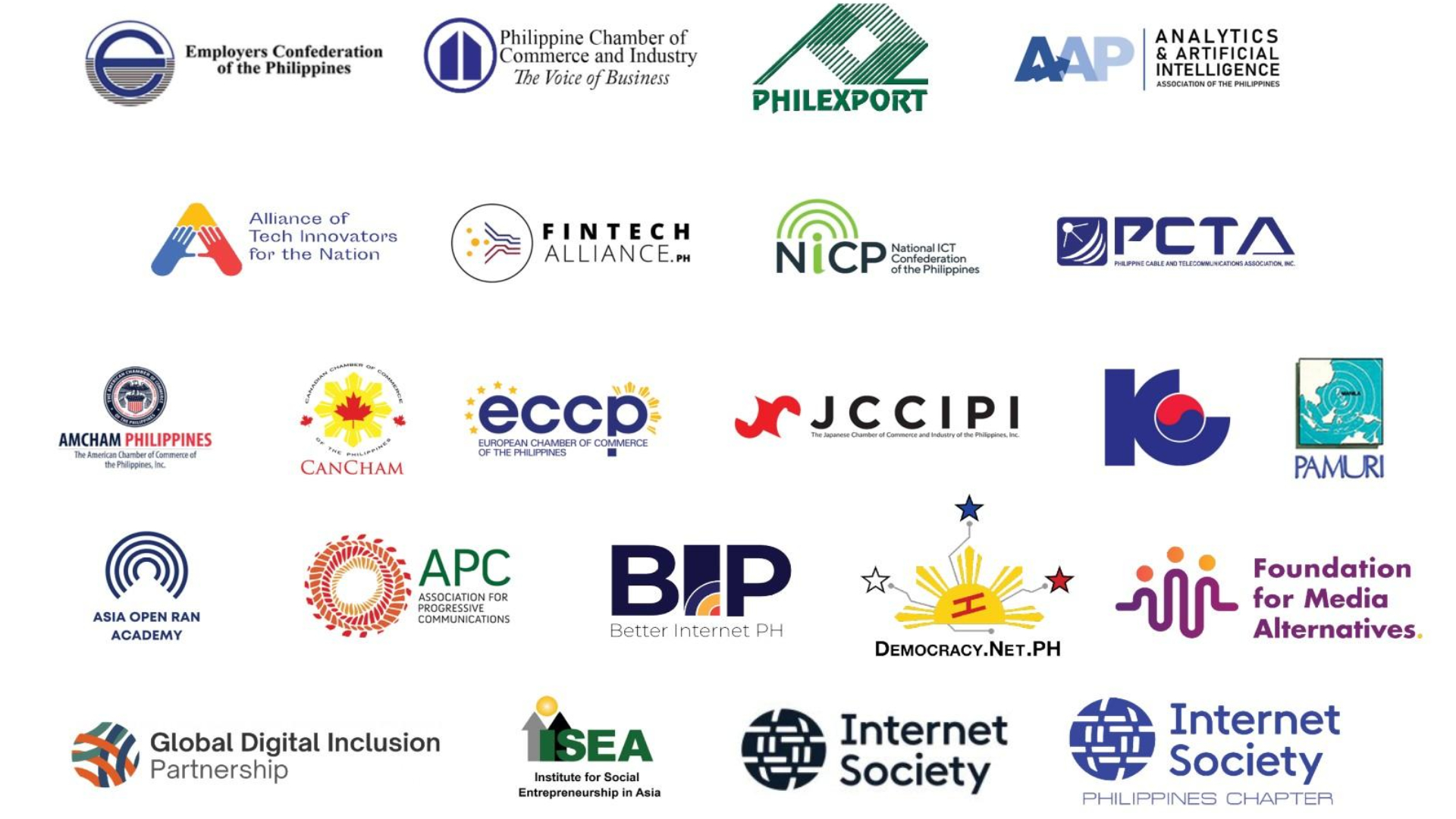We, the undersigned organizations, including Philippine Business Groups, Joint Foreign Chambers, industry associations, and civil society organizations, urge His Excellency, President Ferdinand R. Marcos, Jr., to prioritize and certify as urgent the passage of the proposed Open Access in Data Transmission Act, also known as the Konektadong Pinoy Act (Senate Bill No. 2699, under Committee Report No. 262).
Along with the 10 signatories of a 2023 Joint Statement of Support for Open Access, we recognize the critical need to advance the nation’s broadband infrastructure so that all Filipinos can enjoy the benefits of digitalization.
To increase investment in broadband infrastructure by the private sector and communities, the bill aims to:
1. Promote ease of doing business by simplifying the registration and qualification process for Internet network and service providers;
2. Make it faster and more efficient for providers to build networks by promoting infrastructure sharing and streamlining the permits approval process; and
3. Provide wider access to radio spectrum for wireless Internet by making this resource available to more providers, especially in the rural areas.
The bill will also update the analog-era policies that have long stifled Internet connectivity in the country.
Given these transformative reforms, we request swift action to ensure the passage of this landmark legislation under the Marcos Administration.
The inclusion of Open Access in the Philippine Development Plan 2023-2028 highlights its importance in achieving the President’s digitalization goals for the country.
Since the 17th Congress, the Open Access bill has been consistently approved by the House of Representatives. In the current 19th Congress, the Lower House under the leadership of Speaker Ferdinand Martin Romualdez passed the bill on Third Reading in December 2022. The proposed policy has also been recognized as a priority measure in the September 2023 and June 2024 Legislative-Executive Development Advisory Council (LEDAC) meetings, and included in Senate President Chiz Escudero’s priority legislation for the 19th Congress. We laud the efforts of the Senate, through Committee on Science and Technology chairperson Sen. Alan Peter Cayetano, in shepherding the bill through. The bill is awaiting deliberations when the session resumes.
The Financial Inclusion Steering Committee (FISC), chaired by the Bangko Sentral ng Pilipinas, also expressed its continuous support for the Open Access bill, which it says will enhance Internet “access for the unbanked populace in remote areas of the country” and “promote broad-based access to welfare-enhancing digital financial services.”
The National Economic and Development Authority (NEDA) “strongly advocates” the passage of the Open Access bill, as the country needs better digital infrastructure to promote economic growth. In a recent policy note, the NEDA emphasizes that Open Access will “lead to increased efficiency, reduced costs, and improved service quality.”
The net benefits of Open Access are also emphasized in a recent World Bank policy note,8 which stresses that it is “a viable, promising opportunity to reform the Philippines’ decades-old policy frameworks, thereby adapting to technology and business model changes in the broadband value chain.”
A 2023 Philippine Institute for Development Studies (PIDS) study says the Open Access bill will “allow the entry of more firms in the provision of internet services… as well as facilitate network buildout,” and thus “boost digital connectivity, particularly in communities that are currently underserved or unserved.”9 Similarly, a 2022 PIDS paper points out that the bill will “reduce the barriers to entry and help facilitate the growth of broadband.”10 An earlier PIDS policy note11 recommends that fast-tracking Open Access will “help address the digital infrastructure gap” by “simplifying market entry and promoting infrastructure sharing.”
We, the signatories, believe that the proposed Open Access in Data Transmission Act is the key to unlocking the potential of a more digitally inclusive, economically vibrant, and prosperous country. We therefore urge the President to champion the bill that will transform the Philippines into a truly #BayangDigital.










